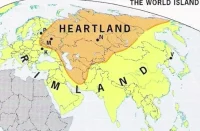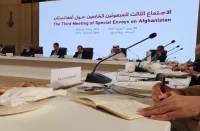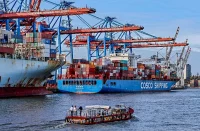The Afghan President Hamid Karzai’s two-day visit to New Delhi on April 26 helped underscore that the strategic relationship between the two neighboring countries is much more than a sideshow of their troubled ties with Pakistan.
Not once did the Indian Prime Minister Manmohan Singh or the visiting dignitary care to utter the word “Pakistan” in their statements. Nor did their formal joint statement reaffirming the two countries’ friendship and cooperation single out Pakistan for reference even once. Yet, Delhi made it quite clear that it intends to stay put as a steadfast partner for the Afghan government in the difficult period ahead.
Dr.Singh described his discussions with Mr.Karzai as “extremely productive” and, significantly, underlined their strategic dimension by including Defence Minister A.K.Antony in the Indian delegation at the official talks on Monday held at the prime minister’s residence.
Dr.Singh voiced Delhi’s firm support to the Afghan leadership in Kabul, which has been subjected to almost incessant attack by the U.S. officials and the media in the recent months. He pointedly articulated India’s “deep admiration” for Mr.Karzai’s “courageous leadership in difficult times”.
Broadly speaking, the Indian viewpoint has been consistently that the high voltage U.S. criticism of Karzai has been illogical. It is undeniable that there is an organic linkage between creating an enabling security environment and harbouring expectations about an expansion of the footprint of the Afghan government or its accelerated progress on governance issues. And it is not as if Washington is unaware of it, either. Yet, a war of attrition has been going on for a year or two already. True to the fierce Afghan sense of independence and national pride, Karzai began fighting back.
Interestingly, a “thaw” in the U.S.’s anti-Karzai rhetoric is becoming apparent. Secretary of State Hillary Clinton conspicuously stressed at a media availability in the Estonian capital Tallinn on April 23 that “President Karzai has one of the most difficult jobs in the world, balancing the internal forces inside Afghanistan, balancing the neighbourhood and all of the regional powers that surround Afghanistan, working to try to integrate the international forces into the fabric of his society. This is a very difficult undertaking… And I would caution us not to sort of single out Afghanistan, a new country, a new democracy, a country trying to fight an insurgency, stand up a government.”
It remains to be seen, though, whether Clinton’s diplomatic idiom translates as U.S. policies on the ground in the downstream of Mr.Karzai’s visit to Washington on May 10-14.
Mr.Karzai’s talks in Delhi focused on two areas of immediate concern to India – India’s development and strategic partnership with Afghanistan within the new parameters of “Afghanisation” and, secondly, India’s perspectives regarding the “reintegration” and reconciliation of the Taliban.
Dr.Singh said, “India is ready to augment its assistance for capacity building and for its skills and human resources development to help strengthen public institutions in Afghanistan.” India’s assistance for Afghanistan already touches a massive figure of 1.3 billion dollars and India is well placed to train Afghan specialists in various fields, provide training and equipment to the Afghan army and cooperate in a range of counter-terrorism and counter-narcotic activities. Delhi already provides 1200 placements in Indian institutions annually for Afghan trainees.
However, any Indian military deployment in Afghanistan is bound to be a potentially exhausting military mission and needs to be avoided. The Indian stance in this regard is similar to that of Russia, which also refuses to get drawn into the military conflict. The challenge facing Indian diplomacy will be to figure out how economic expansion can be the key element of India’s security strategy in Afghanistan. One possibility that remains to be explored is that India and Russia could collaborate with local Afghan partners in reviving some of the Soviet era economic projects in Afghanistan. Any enterprise that leads to employment generation will be particularly useful for stabilizing the Afghan situation.
Without doubt, Mr.Karzai’s visit helped to further refine the Indian thinking apropos the contours of an Afghan settlement. India regards the forthcoming jirga [tribal assembly] in May in Kabul and the Afghan parliamentary elections in September to be “important milestones”. Delhi also agrees with Mr.Karzai’s stance that in order for these processes to be legitimate and enduring, they should be Afghan-led.
Two, in Delhi’s estimation, these political processes led by Mr.Karzai can be optimal only if they go hand in hand with the international community’s long term commitment to stability, peace and development in Afghanistan. Three, the deterioration in the security situation needs to be firmly tackled on a priority basis within Afghanistan as well as in Pakistan, where the syndicate of terrorist organizations and other extremist groups operating in the region enjoy support and sustenance.
Towards this end, apart from the NATO’s surge, the Afghan security forces should be enlarged and developed in a professional manner and provided with adequate resources, combat equipment and enablers and training.
As regards the “reintegration” of the Taliban, Delhi takes a cautious view of the process since in its view the Taliban may exploit the political space to capture power, which was how the ISI implemented a phase-by-phase agenda of the Taliban takeover in Afghanistan during 1994-97. Therefore, Delhi would expect the reintegration process to be “tackled with prudence, the benefit of hindsight, foresight and caution.”
Also, Delhi stresses that any integration process should be Afghan-led and must be “inclusive and transparent”, which is predicated on the belief that Afghanistan is a plural society and the majority opinion is vehemently against the Taliban’s extremist ideology and also staunchly opposes any role for Pakistan as the arbiter or mediator in the peace process.
Significantly, Mr.Karzai underlined to the Indian media “our common struggle against terrorism and extremism”. The joint statement also singled out the two countries’ “determination…to combat the forces of terrorism which pose a particular threat to the region.”
Delhi understands well enough that what is unfolding on the political arena is a grim struggle for the control of the Afghan peace process. Unsurprisingly, Mr.Karzai insists on his prerogative to lead the peace process. On the contrary, Pakistani military would like to cast Mr.Karzai as one of the Afghan protagonists.
Mr.Karzai has built up a coalition of diverse political opinion, which has shared interest in preventing a Taliban takeover. The spectre that haunts the Pakistani military, on the other hand, is precisely that so long as such a formidable Afghan coalition pulls on together as a coherent platform on the Afghan national reconciliation chessboard, Taliban (and the ISI) will be left with no option but to settle for genuine powers-sharing in Kabul that reflects the plurality of Afghan society.
Ostensibly, the Pakistani military wishes to work with the U.S. to reconcile the Taliban but in reality it wishes to seize control of the peace process or at least to dominate it. The Pakistani military banks on exploiting Mr.Obama’s haste to effect a drawdown of the US combat troops by mid-2011.
The ISI has lately shed its “strategic ambiguity” regarding its nexus with the Taliban and is audacious enough to openly flaunt its influence with the hardline “Quetta Shura” and the Haqqani network, making it clear that Rawalpindi is perfectly capable of torpedoing any peace process which is exclusively left to the Afghans.
In fact, the entire enterprise by the ISI (and certain elements within the US’s AfPak team who cherish the mindset of the anti-Soviet jihad of the 1980s) to portray Mr.Karzai as the “problem” falls into perspective. Ahmed Rashid, a Pakistani commentator himself, wrote in a recent article in the Washington Post: “Almost all Afghans, including Karzai’s Pashtun supporters, the non-Pashtun Northern Alliance and even the Taliban oppose any major role for the ISI.”
Pray, where then lies the real problem? The regional powers will do well to understand that Mr.Karzai deserves to get all the regional support he needs at this juncture.
Source: Strategic Culture Foundation














Comments